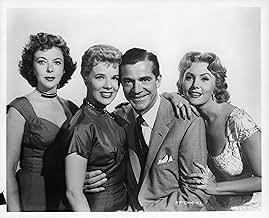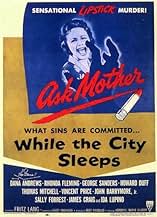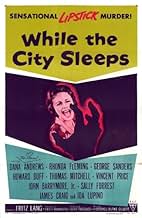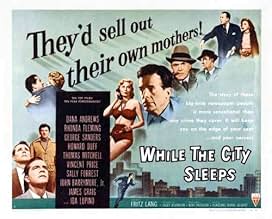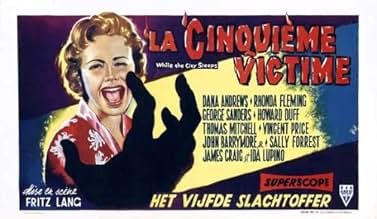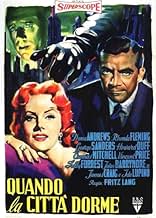Un tueur en série a tué de belles femmes à New York et le nouveau propriétaire d'une entreprise offre un poste de haut niveau au premier de ses cadres supérieurs qui peut obtenir les premier... Tout lireUn tueur en série a tué de belles femmes à New York et le nouveau propriétaire d'une entreprise offre un poste de haut niveau au premier de ses cadres supérieurs qui peut obtenir les premiers scoops sur l'affaire.Un tueur en série a tué de belles femmes à New York et le nouveau propriétaire d'une entreprise offre un poste de haut niveau au premier de ses cadres supérieurs qui peut obtenir les premiers scoops sur l'affaire.
- Réalisation
- Scénario
- Casting principal
- Robert Manners
- (as John Barrymore Jr.)
- Judith Felton
- (as Sandy White)
- Tim - Police Desk Sergeant
- (as Larry Blake)
- Mike O'Leary
- (as Edward Hinton)
Avis à la une
The film is set in the world of newspapers and news agencies, so you expect an aura of venality from the outset. Vincent Price is the vain, self-centered scion of a recently deceased magnate who has taken over his father's business and wants someone else to do all the work. So he creates a new executive position then sets three of his top men against each other vying for the job. The one who 'catches' or names the serial killer terrorizing women in New York, gets it.
Like many of Lang's films, "While the City Sleeps" had the tawdry feel of a B-movie. There is a kind of rough urgency to it that a more main-streamed movie might have lacked. (You could say Lang's genius was for making silk purses out of sow's ears). He didn't work with 'stars' but character players. About the biggest name in the movie and the 'star' of the picture is Dana Andrews, (superb, he was a very under-rated actor), as the Pulitzer Prize winning journalist who, like many of Lang's characters, is less noble than he first appears. As for the rest, despite there being two Oscar winners in the cast, (George Sanders, one of his poorer performances, and Thomas Mitchell, excellent), they were mainly the stable diet of the B-movie, though that said there is a terrific performance from the under-rated Sally Forrest as Andrews' girl who he is not above using as bait to catch the killer and a typically flamboyant one from Ida Lupino.
After this, Lang was to make only one more film in America before returning to his native Germany, the equally cynical "Beyond a Reasonable Doubt". Indeed it's Lang's cynicism and his critique of American values and mores that set him apart, that put him, like those other European émigrés, Otto Preminger and Douglas Sirk at a critical remove from his American counterparts. In this respect, perhaps, the only American who can be compared to him is Samuel Fuller.
Nice and entertaining thriller-plus with the emphasis on the reporters' ruthless methods of gaining information rather than on the killer's motivations. This engaging film contains murder thriller, plot twists , suspense and some far-fetched elements including plausible events. The movie is both a slick, smooth crime yarn and a jaded look at the morals of big-city newspapermen. This is a real critical on the American journalism; as this tale develops, a variety of submerged elements slowly surfaces to make this picture far more one of intrigue. It packs a memorable subway pursuit climax, though suffers only from having too many roles which throws meat to a hungry familiar cast. The movie was adapted from a novel, "The Bloody Spur" by Charles Einstein (1953), which in turn was based on a real murder case that took place in 1946. The picture ¨White the city sleeps¨results to be a classic film (1956) by Fritz Lang, a brilliant and masterly exposition in which Lang gets a first-hand view of the journalistic system, being finely starred by a great star-studded-cast. Acceptable acting from starring Dana Andrews, he is well cast in the impulsive main role, playing a writer who attempts to chase a series killer, while Sally Forrest as his girlfriend, but she seems a little long in the tooth in a role that called for more sparkle. And a good all-star-cast, such as: Rhonda Fleming , George Sanders, Howard Duff, Thomas Mitchell, Vincent Price, John Barrymore Jr, James Craig, Ida Lupino, Mae Marsh, and Robert Warwick.
It displays an adequate and atmospheric musical score by composer Herschel Burke Gilbert. Functional and evocative cinematography in black and white by Ernest Laszlo. This decent motion picture was compellingly directed by Fritz Lang who gets first-hand view of journalism. Here Lang completed 20 memorable years in Hollywood after a distinguished early career in the German cinema that incluyed such classics as Metropolis. Being one of Lang's last Hollywood movies and last big success, it has improved with age, although it still doesn't grip as it should, at times. This great German director Lang made various prestigious silent movies as ¨Metrópolis¨ , ¨Woman in the moon¨ , ¨Doctor Mabuse¨ , ¨Spies¨ , ¨Spiders¨ , ¨Nibelungs¨. And shot other excellent and classic films in all kinds of genres, such as: adventure movie as ¨Moonfleet¨ ; noir films : ¨Beyond a reasonable doubt¨, ¨While city sleeps¨ , ¨The big heat¨ , ¨Clash night¨ ; Drama : ¨Woman in the Window¨ , ¨Human Desire¨ , ¨Scarlet Street¨ , ¨Fury¨ ; Western : ¨Rancho notorious¨ , ¨Western Unión¨ , ¨Revenge of Frank James¨. Rating: 6.5/10. Better than average.
1956's "While the City Sleeps" is a little less impressive but still highly entertaining. It stars some actors who had either seen better days in film or hadn't moved up the ladder much - Dana Andrews, Ida Lupino, George Sanders, Thomas Mitchell, Vincent Price, Sally Forrest, James Craig, and John Drew Barrymore. It's a '40s cast, and the film, set in New York City, has a '40s feel to it.
Andrews plays a Pulitzer-prize winning writer, Ed Mobley, an Ed Murrow type, who does a television commentary. With the death of the big boss of the media conglomerate - which includes a newspaper, television news, and a wire service - his waste of a son, Walter Kyne, (Price) takes over the company. He sets up a competition among the three heavy-hitters in the company - the newspaper editor John Day Griffith (Mitchell), the head of the wire service, Mark Loving (Sanders) and a news photographer Harry Kritzer (Craig). The first one who solves the "Lipstick Killer" murders wins the job as director of the company.
The black and white cinematography gives "While the City Sleeps" a great atmosphere, and some of the characters are a real hoot, including Lupino, who plays Mildred, a columnist for the paper, and Rhonda Fleming as Kyne's gorgeous wife who is having an affair with one of the contenders, Kritzer. Everyone drinks like a fish at a nearby bar, Mobley gets into trouble with his fiancé Nancy (Forrest) for kissing Mildred in a cab, and Kyne's wife is discovered in flagrante delicto due to a bizarre set of circumstances. Meanwhile, Griffith and Loving fight to be first and can't figure out why Kritzer doesn't seem to be trying very hard. Well, he is, just not at the paper. Nancy is set up (with her permission) as a target for the Lipstick Killer, who uses his delivery job to unlock apartment doors by pushing in the button, and then returns and kills his single female victim.
Though a little slow at times, "While the City Sleeps" is more of a newspaper story than a mystery, so there isn't a lot of suspense or excitement to be had. It's just good, old-fashioned entertainment. Recommended for a very good cast and decent story.
This is a promising setup for a hard-edged examination of the cynicism of the newspaper industry, but it lacks that hard, cynical edge. The movie doesn't seem to be all that appalled by the actions of its executives nor does one get a real sense of hard men doing anything to get ahead. In other words, this is no Sweet Smell of Success.
The movie also has some pretty dumb plot elements, most notably reporter Andrews absurd plan to catch the killer. Admittedly this is pretty typical of movies of the kind, but that doesn't make it any less stupid. The dialogue is artificial and often a little ridiculous.
On the plus side, the movie has an entertaining adult sensibility. Even though the Hayes code means little is said explicitly, there is a remarkable amount of implied sex in this movie, and the sleaziness of most of its characters is the most interesting aspect of the film. But overall, this is just sort of watchable.
I just thought it wasn't up to the lofty standard set by Lang in earlier films like 'M" and "The Testament Of Dr. Mabuse", but truth be told, these pictures were made many years before this one. Too much dialogue here, and this picture dearly needed an injection of excitement to break the tedium of the love stories in the sub-plot.
I like Dana Andrews, Thomas Mitchell, George Sanders, et al. A big boost was provided by Ida Lupino, always professional, as a sleep-around newspaper columnist. I also felt Barrymore tended toward ham in his portrayal of the psycho killer. My overall impression is of a master director who was losing his fastball, which is a shame. It could have been so much better.
5/10 - Website no longer prints my star rating.
Le saviez-vous
- AnecdotesThe movie was adapted from a novel; The Bloody Spur by Charles Einstein (1953) which was based on a real murder case that took place in 1946. In that year, William Heirens killed three women and left a message scrawled in lipstick on a bathroom mirror after the second murder. In the message, he urged the police to catch him before he killed again. Because of this, the press dubbed him "The Lipstick Killer".
- GaffesWhen Robert Manners (John Drew Barrymore, as John Barrymore Jr.) is watching Edward Mobley (Dana Andrews) on TV, he is clutching a copy of "Tales From The Crypt". When he drops it to the floor, a closeup of the comic book now shows it to be titled "The Strangler".
- Citations
Ed Mobely: You know, you have very nice legs.
Nancy Liggett: Aren't you sweet.
Ed Mobely: Nice stockings too. What holds your stockings up?
Nancy Liggett: There's a lot your mother should have told you.
Ed Mobely: I didn't ask my mother. I asked you.
- ConnexionsFeatured in Histoire(s) du cinéma: Toutes les histoires (1988)
Meilleurs choix
- How long is While the City Sleeps?Alimenté par Alexa
Détails
- Date de sortie
- Pays d’origine
- Langue
- Aussi connu sous le nom de
- Mientras duerme Nueva York
- Lieux de tournage
- Société de production
- Voir plus de crédits d'entreprise sur IMDbPro
Box-office
- Montant brut mondial
- 7 652 $US
- Durée
- 1h 40min(100 min)
- Couleur


